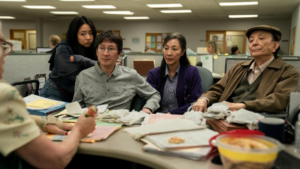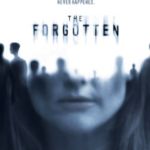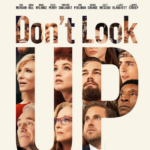Everything Everywhere All at Once (2022)
Today’s guest review is by Justin Petrisek.
Now that the 95th edition of the Academy Awards has come and gone, many of you might be wondering, “What is Everything Everywhere All at Once?” Despite winning seven Oscars for Best Picture, Best Director, Best Actress, Best Supporting Actress, Best Supporting Actor, Best Editing, and Best Original Screenplay, even many people who saw the movie are still wondering what it is all about.
Such is the nature of the chaotic storytelling in Everything Everywhere All at Once (EEAAO), especially when the main character Evelyn Wang (Michelle Yeoh) must save all human existence by exploring hundreds of universes outside of her own. But co-directors Daniel Scheinert and Daniel Kwan utilize the “multi-versal storytelling” – a buzzword which will become increasingly common as Marvel and Disney continue to explore the Kang Dynasty storyline – to tell a story that’s lovingly focused on the importance of family, anxiety, depression, and our ability to value the life we live rather than the life we could have lived.
Evelyn appears at the start of the film as a simple immigrant mother trying to make ends meet as she and her husband, Waymond (Ke Huy Quan), attempt to ward off the IRS and keep their floundering laundromat afloat. However, the laundromat really acts as a stage for the fractured family relationships – Evelyn struggles to relate to and understand her daughter Joy (Stephanie Hsu), Waymond begins to question whether he and Evelyn should get a divorce, and Evelyn attempts to hide every bit of family tension and financial difficulty from her own father (James Hong).
During a critical meeting with unyielding IRS inspector Dierdre Beaubeirdre (Jamie Lee Curtis), Evelyn finds herself confronted by a version of Waymond who claims to be from the “Alpha-verse,” and she is flung into another dimension. Alpha-Waymond explains that Evelyn is the key to stopping the evil Jobu Tupaki who has been moving across the multiverse and destroying each universe and countless lives as she goes. Jobu Tupaki is the embodiment of nihilism and has created a device that will lead to the destruction of all universes.

Let’s pause for a moment – because whether you’ve seen the film or not, that storyline must be sounding strange and perhaps borderline incomprehensible. But don’t we all live in a similar world compounded by competing realities and what can feel like entirely other worlds?
The invasive nature of technology and media has placed a stranglehold on society. All of us exist in a world where we are constantly and overwhelmingly flooded by competing voices, ideas, media, and confrontation. We are catered to and incessantly presented with countless possibilities. We can’t even look at our phones without being confronted by a seemingly infinite number of competing realities. And that kind of chaotic existence is what EEAAO seeks to portray and ultimately poke holes in.
The film is about possibilities, about the road not traveled, about what could have been if we made different choices. And it’s a seductive thought: what could have my life been like if I chose this instead of that, if I said “no” instead of “yes”? Where would I be now and what would my life be like?
Through her glimpses into the parallel universes, Evelyn sees that had she chosen not to follow Waymond to America she could have become a world-renowned singer, martial arts master, an average chef in a chain restaurant, one of those advertisement sign-spinners outside on the sidewalk, or even a woman with hotdogs for fingers (yes, you read that last bit correctly – in one of the parallel universes, all of humanity has evolved with hotdog-like digits). But in one of the parallel universes where Evelyn has become a famous actress, she meets another version of Waymond who pushes back against her “what if” way of thinking.
Evelyn speaks to this version of Waymond (whom she did not marry in this particular universe) about their possible life together as if it was something they had escaped. In her mind, she seems to think that they avoided a terrible fate. But Waymond sees their life together in a different light. “In another life,” he says, “I would have really liked just doing laundry and taxes with you.” For Waymond, the avoidance of hardship does not make one happy or successful.
And so the thought experiment continues: if we could see all of our other possible lives, would we choose to let the one we’ve lived go, sacrificing all our relationships and trials, in favor of a different life? What would that mean for our careers, our family and friends – would we have still met them, experienced the same joys, confronted the same sorrows? As Evelyn pursues Jobu Tupaki, she also finds herself pursuing this same line of questioning.
But as dangerously enticing as the “what if” line of questioning can be, it ultimately obscures the truth which Evelyn comes to realize: human value is innate and does not arise from what we do, how useful we are to society, or even from the choices we make. Instead, the human person is unequivocally precious regardless of station or situation.
In one surprisingly poignant scene that in other movies would most certainly have been cut by a studio for time and relevance, Evelyn and Joy find themselves not as mother and daughter but as two sentient rocks overlooking a vast canyon in a universe where humans never came to be. It is a practically silent scene yet one filled with forgiveness and compassion as Evelyn tries to apologize to Joy and remind her that she is not alone, that her life has infinite value.
In the midst of our chaotic society, with all its competing voices, it can become easy to lose sight of this reality. Similarly, in the middle of the chaos of EEAAO with its blend of sci-fi scenes and martial arts interludes (and yes, hotdog fingers), the truth appears relatively simple: when life does not make sense, when it is chaotic and the possibilities seem endless, the most important reality is the person standing in front of us.
Everything Everywhere All at Once is co-directed and co-written by Daniel Scheinert and Daniel Kwan. The film has an MPAA rating of R for some violence, sexual material, and language.
Justin Petrisek is a writer from Virginia. He received his M.F.A. in creative writing and M.A. in literature from George Mason University as well as an M.A. in theology from the Augustine Institute.













